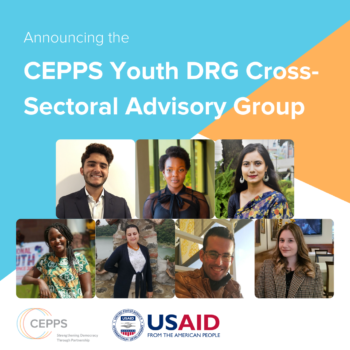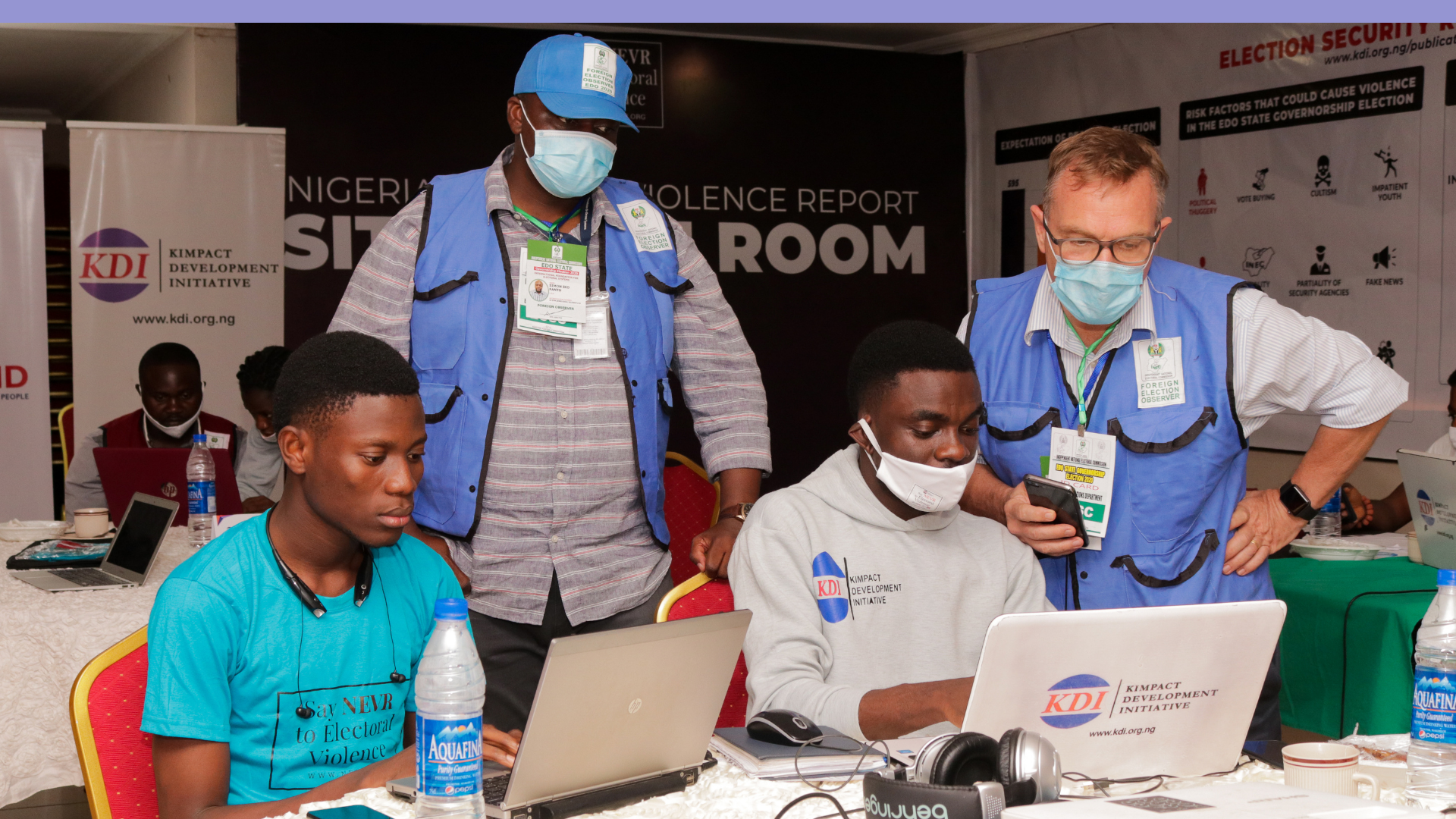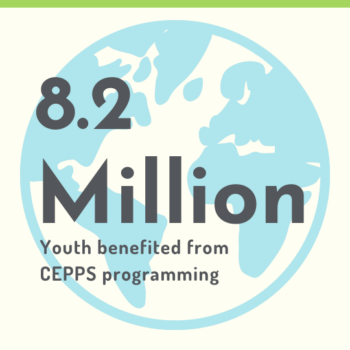To read this issue in its original format, click here.
Dear Colleagues,
In honor of International Youth Day (IYD), this month’s edition of Beyond the Ballot highlights the importance of youth inclusion and leadership in political, social, and economic life, as well as the work of the Consortium for Elections and Political Process Strengthening (CEPPS) in promoting this engagement.
Today’s youth comprise the majority of the population in most developing countries, yet young people continue to be underrepresented in decision-making positions, and remain marginalized in public life. This is exacerbated by their lack of access to avenues for meaningful participation in political and electoral processes, which constrains young people’s ability to make their voices heard, hold decision-makers accountable, and demand equal rights and opportunities. Yet even in light of these obstacles, young women and men around the world are finding creative ways to make their voices heard, often at great risk to themselves.
Recognizing that inequality in all forms threatens socioeconomic development, security, and democratic resilience, CEPPS is working to advance youth inclusion and political leadership. This is being achieved through support for inclusive legal frameworks, the introduction of innovative means for youth engagement by political institutions and social movements, as well as support for newly emerging cross-sectoral and social and behavioral change-based interventions, some of which are highlighted below.
Yours in Democracy,
Jerry Lavery
Technical Director, The Consortium for Elections and Political Process Strengthening
Young people’s inclusion in decision-making and leadership is increasingly considered a priority across youth development sectors. This reflects a growing recognition of the importance of cross-sectoral approaches, as well as deepening organized youth political participation and leadership throughout various aspects of young people’s lives. Their participation is often driven by specific issues like healthcare, the environment, or peacebuilding, which requires working across sectors to help mitigate feelings of disillusionment or apathy in politics, and to more meaningfully engage them in both informal and formal decision-making processes. Cross-sectoral approaches also help young people to understand the complexity of societal issues and address some of the root causes, which often require political engagement. In order to better ensure that cross-sectoral approaches are sustainable, practitioners also increasingly prioritize integrating social and behavior change (SBC) interventions in youth engagement strategies.
SBC interventions directly confront attitudes and beliefs that may either foster or create barriers to young people’s participation in civic and political life. A variety of political and non-political actors, such as peers, parents, civic leaders, teachers, and coaches, influence young people’s lives, whether negatively or positively, intentionally or unintentionally. Their attitudes, beliefs, and actions continue to influence the roles that young people play in political and civic life. Similarly, different actors across sectors have the power to create safe spaces that foster young people’s meaningful participation. SBC interventions have the power to shift negative attitudes and stereotypes about young people and are vital to identifying and targeting harmful social norms that limit their leadership. CEPPS is continuing to integrate SBC interventions into youth development programming, most recently through a virtual SBC training series.
The CEPPS Youth Democracy, Human Rights, and Governance (DRG) Cross-Sectoral Initiative team, in collaboration with a leadership and social change consultant, led partners, practitioners, and donors through a virtual two-part training series in July on SBC interventions. During the series, participants learned how SBC interventions can support youth political participation and leadership. The training series focused on the importance of creating enabling environments and how social norms can either deter or promote youth participation by influencing the behavior of individuals or communities. CEPPS experience has shown that when people have opportunities to build political power and take action both individually and collectively, they can contribute to shaping an environment that is more responsive and inclusive. After learning more about fostering enabling environments, participants discussed ways to map stakeholders and influencers to diagnose barriers to change. Finally, participants discussed the importance of engaging communities in influencing social norms and values to identify opportunities for change in their own communities.
 CEPPS launched the Youth Advisory Group (YAG) in April 2021 as part of its Youth DRG Cross-Sectoral Initiative. The YAG was established to ensure that the activities and resources implemented as part of the initiative resonate with young practitioners and respond to their lived realities. As part of their six-month tenure, the YAG members are implementing an awareness-raising campaign on Twitter and Facebook, highlighting the importance of integrating cross-sectoral approaches into youth leadership and political participation across youth development sectors. The group will also review and provide feedback on a set of cross-sectoral case studies; support the development of a cross-sectoral program toolkit, and share their expertise with other young people through the USAID-funded platform YouthLead.
CEPPS launched the Youth Advisory Group (YAG) in April 2021 as part of its Youth DRG Cross-Sectoral Initiative. The YAG was established to ensure that the activities and resources implemented as part of the initiative resonate with young practitioners and respond to their lived realities. As part of their six-month tenure, the YAG members are implementing an awareness-raising campaign on Twitter and Facebook, highlighting the importance of integrating cross-sectoral approaches into youth leadership and political participation across youth development sectors. The group will also review and provide feedback on a set of cross-sectoral case studies; support the development of a cross-sectoral program toolkit, and share their expertise with other young people through the USAID-funded platform YouthLead.
The YAG members include: Asim Ghweiri (Jordan), Esma Gumberidze (Georgia), Santiago Rodriguez (Colombia), Sobita Gautam (Nepal), Mila Mladenova (Macedonia), Tinashe Mazala (Zambia), and Winnie Akidi Adile (Uganda).
Check out the Youth Advisory Group member bios here!
CEPPS prioritizes engaging young people in our learning agenda, recognizing the important benefits of engaging young people as team members and partners for increasing their self-efficacy and contribution to their own and their community’s positive development. We also prioritize youth engagement in our research and evaluation processes, recognizing that young people, themselves, are able to provide the best, most nuanced understanding of youth issues, which has proven to lead to more effective and relevant programming.
As part of the Youth DRG Cross-Sectoral Initiative, CEPPS will feature programs in Nigeria and Ukraine, as well as the European Youth Democracy Network (EDYN), in the release of a youth-focused resource on designing and implementing cross-sectoral programs. Using recommendations developed under Phase I of the initiative to inform the framework for analysis, the CEPPS Youth Advisory Group will partner with NDI, IRI, and IFES to conduct a reflective analysis of each program. These reflections will focus on opportunities to promote cross-sectoral collaboration, interventions that amplify positive program outcomes, and how cross-sectoral collaboration contributes to solving complex societal challenges.
Stay tuned for more information in upcoming newsletters!
In celebration of IYD, CEPPS is highlighting the impactful work of the CEPPS/IFES local partner Kimpact Development Initiative (KDI). KDI is a youth-focused non-governmental organization (NGO) that supports citizen participation, democracy, and good governance in Nigeria. KDI also promotes young people’s participation in civic and political life. Their approach to youth engagement is driven by the belief that young people generate essential development and growth. Using an inclusive programming approach, KDI activities target young women and men, young people with disabilities, urban and rural youth, young people out-of-school and with low or no literacy, young people in conflict, unemployed youth, and displaced youth. KDI promotes youth engagement within elections, peace, conflict and security, and policy advocacy.
Using social media, television, and radio announcements, KDI has worked to combat social norms that restrict youth participation, particularly for young women, in elections. Leveraging the “We Can Do Better” social media campaign, KDI produced a video highlighting some common misperceptions of women in politics and calling for community action to challenge these negative attitudes and violence against women. KDI has also engaged young leaders to map electoral violence data through the mobile app VTrack. The data collected informed anti-violence messaging which aired on TV and radio announcements to promote peaceful elections in Nigeria.
Learn more about KDI here.

 Through trainings and other activities, more than 8.2 million young people around the world of diverse identities and backgrounds have benefited from CEPPS programming through USG-supported voter and civic education initiatives.
Through trainings and other activities, more than 8.2 million young people around the world of diverse identities and backgrounds have benefited from CEPPS programming through USG-supported voter and civic education initiatives.
Democracy! The Podcast is brought to you by the Consortium for Elections and Political Process Strengthening (CEPPS) with support from the United States Agency for International Development through the Global Elections and Political Transitions Award. Each episode takes an in-depth look at some of the biggest challenges facing the vitality of democracy around the world. Produced in partnership with the International Foundation for Electoral Systems, the International Republican Institute, and the National Democratic Institute, hear from some of the most experienced experts working in the field of democracy, rights, and governance and learn from first-hand accounts as they share how they tackle real-life problems and help move countries towards a more democratic process for all.
Make sure to subscribe on Apple Podcast, Spotify, Google Podcasts, iHeart Radio, and Amazon.